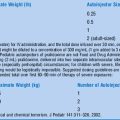Chapter 9 Cough
3 Is the cough reflex mediated by the same pathway that produces bronchospasm?
Chang AB: Cough, cough receptors, and asthma in children. Pediatr Pulmonol 28:59–70, 1999.
4 How much coughing is normal?
Munyard P, Bush A: How much coughing is normal? Arch Dis Child 74:531–534, 1996.
5 What is the most common cause of persistent cough?
While the differential diagnosis of persistent cough (>2 weeks) in children is relatively broad (Table 9-1), the most common cause is probably postviral or inflammatory cough, which has been variably called nonspecific cough, isolated cough, or cough illness. Children who develop a viral upper respiratory tract infection may continue to cough long after other viral symptoms (e.g., rhinitis, fever) have subsided. These patients have a persistent, dry cough (particularly at night), but do not have wheezing, chest tightness, dyspnea on exertion, or other symptoms of bronchospasm. This type of cough may persist for several weeks before resolving spontaneously.
| Infancy (<1 year) |
 Infection: viral, bacterial, chlamydial Infection: viral, bacterial, chlamydial |
 Anatomic abnormalities: tracheomalacia, vascular rings Anatomic abnormalities: tracheomalacia, vascular rings |
 Cystic fibrosis Cystic fibrosis |
 Bronchopulmonary dysplasia (premature infants) Bronchopulmonary dysplasia (premature infants) |
| Preschool (1–5 years) |
 Asthma Asthma |
 Infection Infection |
 Foreign-body aspiration Foreign-body aspiration |
 Cystic fibrosis Cystic fibrosis |
| School age (5–18 years) |
 Asthma Asthma |
 Infection (especially mycoplasma) Infection (especially mycoplasma) |
 Smoking Smoking |
 Psychogenic causes Psychogenic causes |
7 Is cough-variant asthma underdiagnosed?
Key Points: Etiology of Cough in Children
1 Most children with persistent coughing will have a postviral or inflammatory cough that does not respond to any standard therapies but resolves spontaneously over a period of weeks.
2 Cough variant asthma is rarely the appropriate diagnosis for a child with a persistent cough who does not have other signs of asthma (e.g., exertional dyspnea).
3 Passive cigarette or cigar smoke aggravates coughing in children.
4 Persistent coughing in a young child after a severe choking episode may represent aspiration of a foreign body into a mainstem bronchus.
10 Does antibiotic treatment of cough due to an upper respiratory tract infection prevent subsequent pneumonia?
12 What problem should come to mind if a toddler presents with a persistent, nagging cough after a severe choking spell?
13 What is habitual cough?
de Jongste JC, Shields MD: Chronic cough in children. Thorax 58:998–1003, 2003.
14 What are the characteristics of a patient with habitual cough?
Bush A: Paediatric problems of cough. Pulm Pharm Therapeutics 15:309–315, 2002.
16 What is one thing parents should always do if their child has a persistent cough?
They should stop smoking and forbid others from smoking in the house where the child resides.


